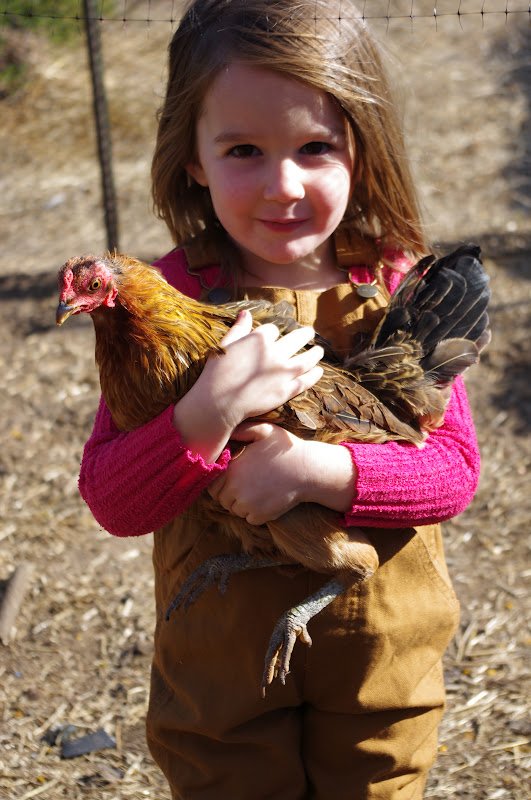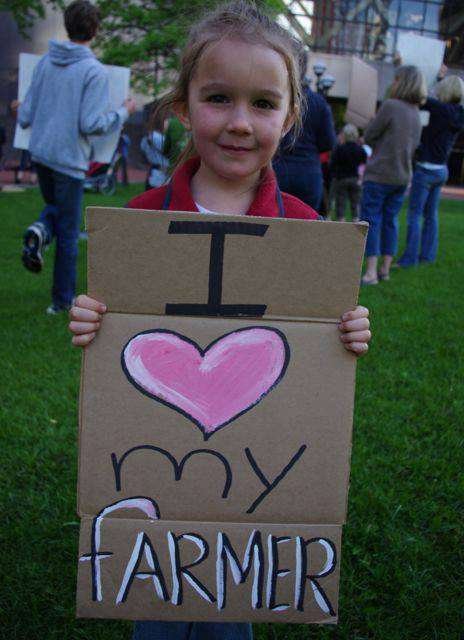EXCLUSIVE Interview With Couragous Family Who Left 9 to 5 Rat Race to Pursue Dream of Off Grid Living

Meet Chuck and Jennifer, a spirited couple who were simply trying to figure out the best way to raise their children. This drive gave them the courage to quit their jobs, with paid vacation, health insurance, and the lot, to pursue their dream of living sustainably. Their goal, a simple yet profound one, “to live in harmony with the earth, using the land and the skies to our benefit.”
After hearing about their courageous journey, we set out to get this inspiring family’s back story. Below is our interview with them. Enjoy.
MATT : Hi Jennifer and Chuck, it is a pleasure to meet you two. I have been a big fan ever since I stumbled across your website, http://www.duskwindfarm.com. I could only hope to have the fortitude that you all have to make such a drastic transformation for the better.
Before we get started I’d like to express my condolences about the recent loss of your beautiful dog Shep. I know how it feels to lose such a friend and family member, it can be challenging when experiencing such a loss.
JENNIFER: Thank you, Shep was a great farm dog, he is missed daily.
MATT: Ok, without further ado, let’s get started, I am sure our readers have plenty of questions, as do I, so I will try and cover as many angles as I can think of here.
What was the main motivator that made you all decide to leave the world of 9 to 5 labor and pursue a life of farming?
JENNIFER: We were both unhappy working desk jobs, and knew we wanted a little land and a garden. Chuck had thought about becoming a butcher, and I love gardening and cooking. We started reading and learning more about the food system and slowly started getting out of it. And before we knew it we were talking about farming.
CHUCK: Our first motivation was to provide ourselves with our own food. Which on the surface may sound like a simple idea, but in reality we had very little experience besides Jen’s gardening. We had absolutely no experience raising livestock. So we started things out by looking for jobs within the farming industry and that’s what led us to getting a management job at a 150 cow organic dairy.
MATT: Okay, so you all gradually moved up to it, how long did it take you all to finally get up enough courage to make the final move, did you set a date or have to sell a bunch of possessions?
JENNIFER: Not having any farming background we felt like we needed to start slow, learn from someone else. We started looking for farms that we could apprentice at. Within a month or so we found a farm that hired us to manage their 150 cow organic dairy. We worked for them for almost a year, there were issues there that motivated us to leave and go out on our own. Chuck’s grandparents had farmed and we though we wanted to farm that land. We did sell many things, we needed to scale back since we were going to be living in a 32 foot travel trailer until Chuck built our house.
MATT: That is truly courageous. Were there any particular obstacles that you all faced when making this decision that are worth mentioning?
CHUCK: I think the biggest obstacles came after the decision was made. We both knew we wanted something different, so I think the decision to make the move was the easiest.
JENNIFER: Well we really knew nothing about starting a farm or farming in general, by the time we had moved to the family farm we had a few cows, some sheep, chickens, ducks and rabbits. Thankfully there was a barn we could use, and we did fence in a two-acre plot where all the animals started out so we could plow and seed the main pasture that had been a crop field for many years.
MATT: I am a big fan of the homeschooler, do you all incorporate this aspect into the off grid lifestyle that you all live?
CHUCK: Living off the grid is about independence and innovation. I think these are two big ideas that we incorporate into our homeschooling.
MATT: It says on your website that you all lost the farm in 2010 after only 3 years. Would you care to elaborate on what happened? How did you get it back, or are you in a different location now?
CHUCK: In our journey to live off the land we made two big bad decisions. Both of which, looking back, had red flags all over them. The first was to take the job at the organic dairy farm. We were both so anxious to start on this new chapter of our life we ignored some obvious red flags and just put our head down and pushed forward. About a year later we decided these issues were too big to ignore. This situation also put us back at the beginning in regards to our farming dream. One option was to move on to family property. Once again, red flags were everywhere, but we were desperate and naïve. As most people can attest family can be a very difficult dynamic to deal with. Our experience was no different. We were not only living in a 365 square foot house with no electricity and running water, we were getting outside pressure and ridicule by a close minded family. Looking back at it now, I cannot believe we made it 3 years. It almost cost us our marriage and it was not how we wanted our kids to grow up. We were bending to others expectations and that is not what being independent is all about.
JENNIFER: Leaving was awful we had worked so hard to build a life, not only on the farm but also in the community. The worst part was having to sell our animals. It has been 2 ½ years and we still get emotional over the loss of the cows. Now we are in a different state and rent form a wonderful man who only wants to see us succeed. We hope one day to be able to buy the homestead and the surrounding land.
MATT: Oh wow that must have been difficult. Losing all the animals must have been horrible.
CHUCK: Yes. Hardest part.
One of the greatest things about farming is there is no typical day. Just when you think you finally have it all figured out you fall flat on your face.
MATT: Now that we have your life story, can you tell us what a typical day at Duskwind Farms consists of?
 JENNIFER: One of the greatest things about farming is there is no typical day. Just when you think you finally have it all figured out you fall flat on your face. There are the everyday chores; milking, feeding, watering, and moving fencing. Since our goal is to provide our family with most of our food, we have a rather big garden so there is a lot of freezing and canning going on as well. Beyond that we also work off the farm, and Chuck is finishing his bachelor’s degree.
JENNIFER: One of the greatest things about farming is there is no typical day. Just when you think you finally have it all figured out you fall flat on your face. There are the everyday chores; milking, feeding, watering, and moving fencing. Since our goal is to provide our family with most of our food, we have a rather big garden so there is a lot of freezing and canning going on as well. Beyond that we also work off the farm, and Chuck is finishing his bachelor’s degree.
MATT : Wow, you guys sound like a busy group! What type of vegetables do you all grow? What type of animals do you all raise?
 JENNIFER: We are a small farm with 3 cows, 11 goats, one ewe, 5 rabbits, 4 pigs, 38 chickens, and one beehive. A couple of weeks ago Chuck butchered 75 meat chickens for our freezer. Our laying hens are out finding their own food, the rabbits are in a movable pen, the cows, goats and sheep are on pasture, being moved every day to new ground. The cows are Dexters, a small tri-purpose breed (meat, milk, oxen), the goats are Nubian a meat and milk breed, the rabbits are American a meat breed, the laying hens are Wyandottes, and the pigs are a mixed breed. Most of the animals here are on the Livestock Conservancy list, not something we really tried to do but we really like the old true breeds.
JENNIFER: We are a small farm with 3 cows, 11 goats, one ewe, 5 rabbits, 4 pigs, 38 chickens, and one beehive. A couple of weeks ago Chuck butchered 75 meat chickens for our freezer. Our laying hens are out finding their own food, the rabbits are in a movable pen, the cows, goats and sheep are on pasture, being moved every day to new ground. The cows are Dexters, a small tri-purpose breed (meat, milk, oxen), the goats are Nubian a meat and milk breed, the rabbits are American a meat breed, the laying hens are Wyandottes, and the pigs are a mixed breed. Most of the animals here are on the Livestock Conservancy list, not something we really tried to do but we really like the old true breeds.
This year our garden had: Garlic, potatoes, tomatoes, hot and sweet peppers, cabbage, celery, cauliflower, corn, cucumbers, squash, carrots, lettuce, onions, beans and peas.
MATT: That sounds incredible! Truly a diverse farm. This is probably a silly question but is everything you grow/cultivate organic or beyond?
JENNIFER: The term “organic” is a government owned term that we try and stay away from. We do not raise any animals or produce using chemicals.
CHUCK: All of the vegetables are grown organically. As for the animals, the grain we do feed to the pigs and chickens is local. Our goal is to be GMO free, but that is pretty much impossible if buying from a mill. We will buy organic grain, but a lot of times it is not local. Our philosophy is that it’s not very organic if the grain comes from the other side of the country. We are not interested in raising row crops. So our goals is first, to limit the amount of grain we need in the first place and second, find non-GMO crops from a local farmer.
MATT: Jennifer, that is a great comment about the term organic, I tend to agree. I’ve interviewed several sustainable farmers and they have said basically the same thing. I’ve been told that government certified organic is basically a racket, in which the state comes by once a year and collects a check to provide a stamp. Most ‘organic’ farmers that I know have long since abandoned the practice of government extortion for a rubber stamp. Do you guys sell any of the harvest or participate in a local farmers’ market? Is that how you are able to pay the bills?
JENNIFER: Yes, I actually helped organize and start a farmers’ market this year, we do sell many things but not enough to pay the bills, yet. We also have sold some animals for meat. Both of us work off the farm as well. We do hope that one day our farm will sustain us.
MATT: Well I hope you all get to realize your goal very soon. Your family obviously has a drive to incite positive change in this world. It even shows with your beautiful daughter holding up the sign at the rally for Alvin Schlangen that said, “I love my farmer.” Have you all faced any speed bumps from bureaucracies out to protect the Agri-giants? If so, how have you dealt with them?
We want our animals born here and to die here. We believe the last hours of that animal’s life should not be filled with stress.
JENNIFER: Actually we have. When we first started our farm we bought organic pasture seed from a friend. I wrote about it on our blog. At that time we provided no contact information, however there was a photo taken by a friend that I linked to her business site. One day some Ag guy called her asking for our contact info. She did not give it to him, instead called me with his info. I called and he was telling me that the seed we got was bad and he needed tags and receipts and whatever information I could provide. It was the strangest thing, I kept asking why our friend had not called us, and telling him that all the seed was growing so what was wrong with it. He gave me some story about how our friend was located in a different part of the state and this Ag guy was so close so it just seemed more convenient, and he was not exactly sure what was wrong with the seed as his supervisor did not give him all the details. He wanted to meet with Chuck and I in the next few days to get all the information from us- I told him that I had to talk to Chuck about it first and would have to get back to him. As soon as I got off the phone I called our friend, it turned out the state and our friend were in some stupid battle and the state was trying to dig up anything they could to help further their agenda.
CHUCK: I think our biggest speed bump right now is how to start a small farm that sells direct to the customer and build a successful business. One of the things we want to offer our customers is the fact that our animals never see a livestock trailer. We want our animals born here and to die here. We believe the last hours of that animal’s life should not be filled with stress. Imagine how hard it is for an animal who has never seen a livestock trailer to be shipped off to a processing plant 2 hours away to sit outside the plant with the smell of death all around. My point is, you can’t process livestock larger than a chicken and sell direct to the customer. It’s unsafe in the eyes of gov’t. I could go on and on, but the point is the regulations that surround our food system are geared for the industrial food system. And those regulations pretty much squash innovative and entrepreneurial ideas.
MATT: Jennifer, that sounds like a typical function of the government/industry machine, truly sad. And Chuck, that is very well said, I could not agree more. I am sure that you know this already, but your story is a huge inspiration to some folks, do you have any advice for those that wish to pursue similar interests?
CHUCK: Go for it and be patient.
JENNIFER: Buy local, buy direct from a farmer, visit farms. Dive headfirst. The best way to learn is to do it. Read any and all Joel Salatin books- whether you farm, want to farm, or eat!
MATT: Well that sounds like great advice, thank you all very much for your time. Thank you from all of us here at TheFreeThoughtProject.com, whether you know it or not, you serve as leaders, through example, of how we can turn this destructive behemoth around, and become a more sustainable society.
If you’d like to show your support for this amazing family and follow their progress, their website is http://www.duskwindfarm.com/. It is filled with tons of pictures of their beautiful animals and crops. You can also follow them on facebook at https://www.facebook.com/DuskwindFarm

Great adventures ahead. No worries!!
Upvoted and re-steemed, yo!
in some places there are mobile abattoir who will come right to your farm.
huh?
A mobile slaughterhouse will come to your farm and process your animals on site and will give you fully inspected meat when they are done.
Self sufficiency is the key to living a fulfilling life. The way God intended.
They are brave indeed. I am stuck for the nonce, however, I am gonna join yah soon. Hats off people. More of us need to start starving the beast.
heck yeah! "off grid" starts at your current home.
Great interview!
Decentralization, proceeding one family at a time. :)
thank you nxtblg!
They seem to be a smiling family. Nice post.